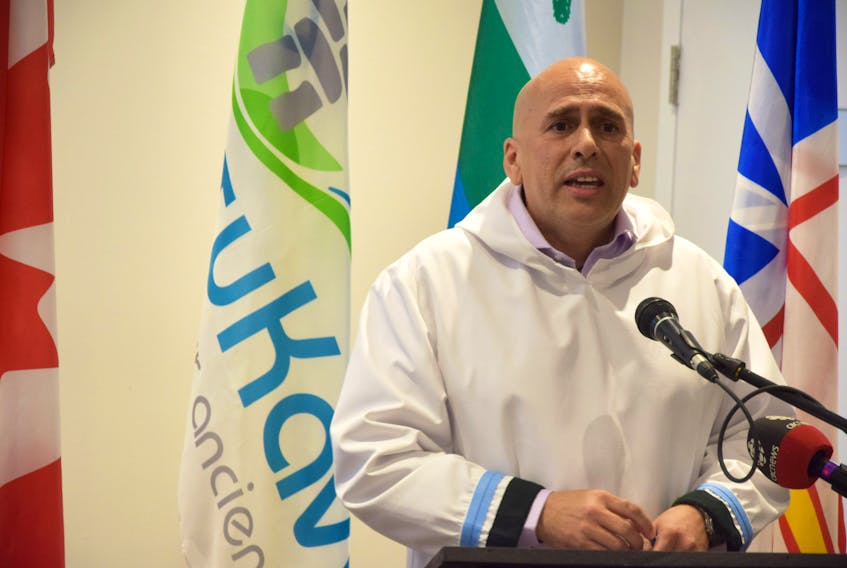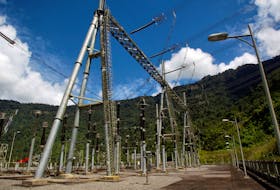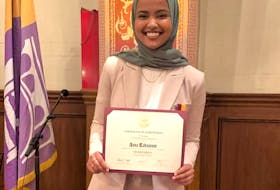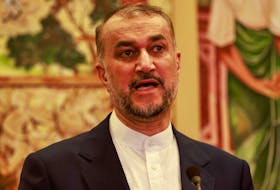Updated:
Happy Valley-Goose Bay — Discussions have begun between the NunatuKavut Community Council (NCC) and the federal government to recognize the Indigenous rights and self-determination of NCC members, NCC president Todd Russell announced Thursday in Happy Valley-Goose Bay.
“It means that we will be engaged in talks about our people once again and have decision-making power over our lands and resources,” Russell said. “It means a greater ability to deliver programs and services like health care and education that are aligned with our values and way of life. It means that developments and projects should only be happening on our land with our consent and participation. It means that we should never again lose another community to relocation.”
Indigenous Affairs Minister Carolyn Bennett said the process looks different than it has in the past. She said they are replacing the comprehensive claims policy and inherent rights policy with a recognition of rights and then discussing how it’s implemented and exercised.
“Right now we are really excited by the promise of the governance the NunatuKavut government and community council are already demonstrating and now we get to sit down and work out what those rights look like,” Bennett said.
When asked if land would be part of the claim, Bennett said it would be part of the ongoing negotiations. She gave examples of other Indigenous groups that prioritized rights over land, such as health care and education.
Russell said NCC has ideas on what they want to see in the negotiations, and land is certainly part of it.
“We’ve always said land is fundamental to our identity and where we’re from,” he said. “Of course land will form part of the discussions going forward.”
He said the previous land claim process was inherently biased and this new process holds more potential, but it’s more about the health and well-being of the people.
“It’s about preserving our culture and way of life, and what we’re announcing today is a process to getting us there,” Russell said.
In terms of a timeframe, both the NCC and the federal government said it’s hard to pin down because it’s an ongoing process.
NCC member Richard Michelin of North West River said he waited and prayed for this day.
“Like all our people, I’ve been pushed around for years, put down, and maybe now it’ll settle down,” he said.
Michelin said a lot of things went on over the years, like people losing the language. He says if a person spoke Inuktitut they were put down.
“Now everything has changed. It’s getting better.”

Innu oppose plan
Meanwhile, the Innu Nation had some strong words for the federal government in reaction to the announcement that the feds and NunatuKavut would move ahead with indigenous rights negotiations.
Peter Penashue, a former Member of Parliament for Labrador and member of the Innu Nation land claim negotiation team, said the announcement creates a “real mess for land claim negotiations in Labrador for the next 30 years.”
The Innu Nation has been negotiating its land claim with the federal government since 1977 and is now in the final stages. Penashue said this move to recognize Indigenous rights for NunatuKavut jeopardizes all of that.
“It’s a new group and suddenly we find ourselves needing to fight over land with this new group, NCC or the Metis. And now, after negotiations with Canada and Newfoundland for over 30 years, we’re going to have a dispute over land,” he said. “Because they’re going to be seeking the same rights in those land we have chosen and we have selected.”
Penashue said they expect NunatuKavut to claim the Muskrat Falls and Lower Churchill areas, which is going to complicate the Innu Nation’s claim on the same lands.
The Innu Nation feels the federal government should have concluded the land claim with them before speaking to another group, Penashue said.
He said they obviously dispute the NunatuKavut claim on those lands and he disputes whether they should be considered Aboriginal.
“They (have) obviously been here for some time and a lot of them have been born here. But are they Aboriginal? ... I don’t think so,” he said.
The NunatuKavut Community Council was previously known as the Labrador Metis Association and changed its name in 2010. The Supreme Court of Canada ruled in 2016 that certain groups of what are commonly known as Metis have the same rights as other Indigenous groups. Penashue said in his opinion this sets a precedent in Canada.
“There has never been a group that sprung out of nowhere that’s suddenly an Aboriginal group,” he said.
He said there have been longstanding Aboriginal groups in the territories and other places in the North, but they’ve always known each other as being Aboriginal groups.
“Now here we are in a very unusual circumstance, settlers becoming Metis becoming Inuit and now are going to fight us over land. That’s a very unusual case.”
Penashue said this should be a concern for all First Nations who have treaties with the federal government. He said Metis groups have never been able to prove they have land title and land rights before, but now the Metis across the country are entitled to have land claims.
“That’s a huge fundamental change in Canadian policy. This is huge. I don’t know if you have an appreciation of what Canada has done today. This is historic. They have now recognized a group, in this case the Metis, to be recognized first of all as being Indigenous and recognizing them as having land rights. And that’s going to have a huge impact across the country.”
The Labradorian
Previous story:
Federal government move towards Indigenous rights with Nunatukavut Community Council
HAPPY VALLEY-GOOSE BAY, N.L. — A historic announcement was made in Happy Valley-Goose Bay on July 12.
Representatives from the federal and provincial governments were on hand with Nunatukavut Community Council (NCC) president Todd Russell Thursday to announce the beginning of discussions with the federal government to recognize the Indigenous rights and self-determination of NCC members.
“It means that we will be engaged in talks about our people once again and have decision making power over our lands and resources,” Russell said. “It means a greater ability to deliver programs and services like health care and education that are aligned with our values and way of life. It means that developments and projects should only be happening on our land with our consent and participation. It means that we should never again lose another community to relocation.”
Carolyn Bennett, federal minister of Indigenous Affairs, made the announcement and said the process looks different than it has in the past. She said they are replacing the comprehensive claims policy and inherent rights policy with a recognition of rights and then sitting at the table to discuss how it’s implemented and exercised.
“Right now we are really excited by the promise of the governance the Nunatukavut government and community council are already demonstrating and now we get to sit down and work out what those rights look like,” Bennett said.
When asked if land would be part of the claim, Bennett said it would be part of the ongoing negotiations. She gave examples of other Indigenous groups that prioritized rights over land, such as health care and education.
Russell said NCC has ideas on what they want to see in the negotiations and land is certainly part of it.
“We’ve always said land is fundamental to our identity and where we’re from,” he said. “Of course land will form part of the discussions going forward.”
He said the previous land claim process was inherently biased and this new process holds more potential. He said at the end of the day, though, it’s more about the health and well-being of the people.
“It’s about preserving our culture and way of life and what we’re announcing today is a process to getting us there,” Russell said.
In terms of a timeframe, both the NCC and the government said it’s hard to pin down since it’s an ongoing process.
Richard Michelin of North West River is an NCC member. He waited and prayed for this day.
“Like all our people I’ve been pushed around for years, put down and maybe now it’ll settle down,” he said.
Michelin said a lot of things went on over the years, like people losing the language. He says if a person spoke Inuktitut they were put down.
“Now everything has changed, it’s getting better.”









